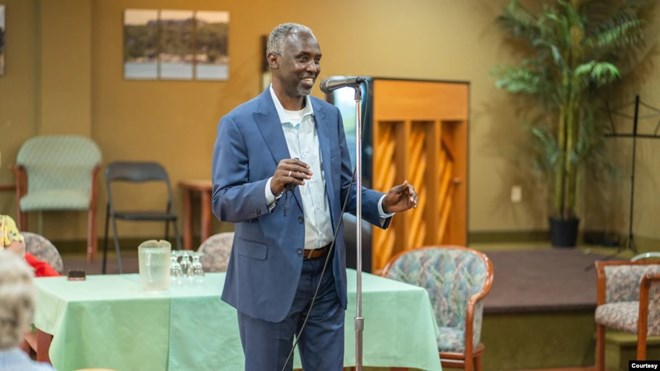
Thursday April 7, 2022

Ali Duale, seen here addressing a community event in Halifax, came to Canada as a refugee from Somalia in 1997 and was elected to the Nova Scotia provincial legislature last year. (Photo courtesy of A. Duale's office)
HALIFAX, CANADA — Somali-born refugee Ali Duale has positive memories of his arrival in Canada's Atlantic province of Nova Scotia, where he first entered his hotel room to find a welcoming note in his native language along with hygienic supplies and a check to pay for anything else that he needed.
Twenty-five years later, Duale is repaying the province with his service as an elected member of the provincial legislature representing a district in Halifax, the provincial capital. That service, he says, is all about his sense of community.
"The word community to me has many meanings," Duale told VOA in a recent interview. "I'm a Muslim, I'm Black, I'm a refugee, I'm a newcomer, I'm a Nova Scotian, I'm a Haligonian. Each one has a meaning to me and that's what brought me to what I am today."
Duale has a message for any other Somalis hoping to make a new home in Nova Scotia, an often-overlooked part of Canada with a sparse population, an otherworldly landscape and a quaint ocean-faring lifestyle in the fishing towns that dot its coast.
"It doesn't matter how much education you have, or experience," Duale told VOA. "Quite honestly, most of the time the newcomers, irrespective of their profession … it will not take less than five or 10 years to establish here or settle down. It's a great place to be but also people need to prepare for the reality of life here."
In spite of the warm welcome he received, Duale said he would like to see Nova Scotians do an even better job of welcoming new refugees.
"When people come here, as you know, these refugees have gone through a lot of mental issues, a lot of difficulties. We need to be more kind. We need to treat them with respect, and we need to not be judgmental. ... Other than that, I think that we're doing OK."
The province is perhaps an unlikely place for an African migrant to end up. Blacks account for only about 23,000 of the province's roughly 1 million inhabitants, and of those, fewer than 2,000 are foreign-born.
But people of African origin have a long history in Nova Scotia, dating back to Mathieu de Costa, who served as a translator speaking to indigenous people when French explorer Samuel de Champlain visited the coastline in the early 1600s, according to a provincial government website.
During the American Revolution in the 1770s, hundreds of African slaves escaped behind British lines and were transported to Nova Scotia, where they were joined two decades later by a group of rebellious slaves deported from Jamaica, known as Maroons. Many were later transported to what is now Sierra Leone.
In subsequent years the province became a destination for escaped American slaves spirited north along what was known as the "Underground Railroad." A thriving Black community known as Africville grew up near the Halifax harbor, where it remained until it was pushed out by industrial expansion in the 1960s.
Today, opportunities are available to Africans in Nova Scotia if they are persistent, according to Oluwaseyi Sanni, a lawyer from Nigeria who hopes to practice law in Halifax. While working toward his Canadian law degree, Sanni has been an editor and researcher for Afronomicslaw, a blog about African economics, politics and debt.
"Well, I guess I could say that finding a desirable job was not as easy as I imagined it would be when I moved here," Sanni told VOA. "I learned that just like everywhere, there is a sense of resilience and diligence required to getting one's desired career goals. The key is in being dedicated to whatever one finds their hands to do."
Currently, Sanni is working on one of the most famous legal projects in Nova Scotian history, the inquiry into a 2020 mass shooting that started in Portapique, Nova Scotia, and left 22 people dead.
"I am not at liberty to go into details about my work at the Mass Casualty Commission as the proceedings are still ongoing," Sanni told VOA. "However, I will say it has been a huge privilege being part of such important work. It has also been a learning curve for me as well."
"Nova Scotia has lots of Africans and this potentially makes it easy to get settled when one arrives here," Sanni added. "However, my advice would be to explore friendships and relationships that transcend race. Some of the deepest bonds I have established have been with people from other races."
That sentiment is warmly welcomed by Canadian Minister of Immigration Sean Fraser, who represents a Nova Scotia district in the federal parliament in Ottawa.
"In Canada, diversity is one of our greatest strengths," he said in a statement provided to VOA for this article. "Our government is committed to an immigration system that contributes to economic growth, supports diversity and helps build vibrant, dynamic and inclusive communities from coast to coast to coast, including right here in Nova Scotia."
"Atlantic Canadians are known for their hospitality and welcoming nature, making us one of the world's top destinations for international talent," Fraser added.
"We all benefit from new energy and ideas brought here by people who choose our province to build careers and raise their families. We'll continue to ensure that those of African descent equally and fully participate in the economic, social and political institutions in Canada."